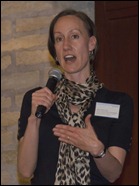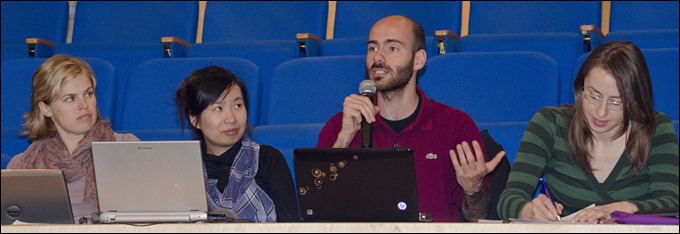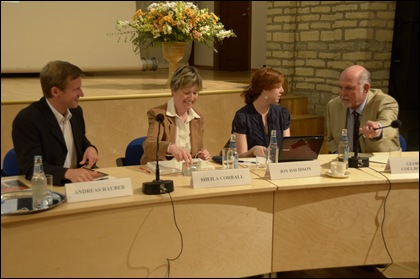It is no secret that very few of those presently involved in (R&D in) digital preservation have been formally trained to do so. As Meg Phillips of the US National Archives said at the conference: ‘Present staff at cultural heritage institutions have patched it together – they have degrees in the arts or humanities, and what they know of digital preservation they have mostly learned on the job.’ This is no wonder, of course, since DP is a new field and it takes a while for supporting industries such as education and training to catch up. Judging by the presentations of the educational panel this work is still ongoing. Because it does not only involve defining new skills, but also combining those skills with existing skills (library, museum, etc.), fitting all those skills in job descriptions that real-live people can actually fulfill and fitting all those job descriptions into effective work flows and organizational settings. Then develop training programs and curricula that can deliver those people.
Educational panel, from the left: Andreas Rauber (TU Wien), Sheila Corrall (Univ. of Sheffield), Joy Davidson (UK DCC), George Coulbourne (US LoC)
 To make things more complicated, the ‘new’ skills and the ‘old’ skills do not always go well together. As Joy Davidson emphasized, this is where the library meets IT and these two have very different service-mindsets: whereas libraries are about very personal, individual service, IT is about rolling services out to lots of people. Service requires softer skills (communication), whereas IT is more about facts and figures.
To make things more complicated, the ‘new’ skills and the ‘old’ skills do not always go well together. As Joy Davidson emphasized, this is where the library meets IT and these two have very different service-mindsets: whereas libraries are about very personal, individual service, IT is about rolling services out to lots of people. Service requires softer skills (communication), whereas IT is more about facts and figures.
And there is more. When asked to define her ‘fantasy staff member’, Meg Phillips of the US National Archives and Records Administration (and one of the few archivists present), said that NARA needs staff with broad knowledge of formats and digital preservation tools, staff who can think, who can help make decisions. Howard Besser of New York University added: ‘We do not need tinkerers; we need people who can deal with the scale of the digital challenge, who can deal with new, emerging problems.’ Some existing staff can be trained new skills, Howard said, but as this is more about mind set than actual skills, we must accept that some of the staff we have will not be able to make the change. It is the younger people, the students, who have the right mind frame.
 Students attending the conference: ‘Please continue to invite students to these meetings; it develops our thinking at a strategic level.’
Students attending the conference: ‘Please continue to invite students to these meetings; it develops our thinking at a strategic level.’
The panel reviewed a number of training and education initiatives (check out the slides here). Joy Davidson said she was happy about the level of international cooperation between the different projects and institutions. Yet there is still a lot of diversity in the language used by stakeholders in the different contexts, which makes it hard to develop cross-disciplinary curricula. It is is continuing to be difficult to determine what is generic about DP (education) and what is specific to the contexts.
Here is the educational panel’s answer to the question “Where do you want to be in five years?”
- foster inter-disciplinary group projects in undergrad and postgrad courses (making use of tools like Planets Testbed and Plato). This could be a quick win
- ability to describe and compare data management courses across international postgraduate research courses
- establishment of frameworks for assessing data management skills and professional development progression paths for skills development for a range of disciplines
- greater practical experience opportunities for students
- greater engagement with professional bodies and industry to cooperate on raising awareness amongst researchers of the need to acquire sound data management skills
- ability to match skills across data curation lifecycle and the various roles
- development of information science courses that complement and bridge the gaps in the data management skills of researchers and information technologists. More real-life examples of data management and curation as it relates to day to day activities on the job
- more induction level data management training for all secondary, undergraduate, postgrad and PhD students.
That is some to-do list! But a crucial one. In the end, even in a technical field such as digital preservation, it is the people that make the difference – between ‘tinkering’ and a truly digital mind-set.


2 opmerkingen:
I am one of the students who took the microphone during the session (btw, thank you for the very cool picture you posted ;-) ) and I am very happy to finally read your recap of that day!
During the breakout session Joy Davidson asked us some suggestions about how to integrate better the training courses in the ongoing working initiatives.
I came up with a possible answer which I wrote down on my blog (http://fraenrico.carcosa.it/?p=940), together with some considerations about the education panel; since my blog is not in english I would like to share here my thoughts.
My idea is that institutions should look closer at students in schools as potential future employees. They should be more active "inside" the schools: instead of waiting for the end of the courses, when students start sending cvs around, they should anticipate this moment and get to know students better, directly and closer, through visiting lecturers, aimed seminars, internship programs. The relationship between institutions and schools should be more active, dynamic and bi-directional during the school years, and not afterwards; schools, as I have written, should be seen as "recruitment camps" by library institutions. Or if you allow me a word-game, schools must be considered as "fishing-schools", where "new young talents" can be directly chosen and selected as the future staff.
This is what I would have liked to tell at the conference, but I could not do it before some days of quiet reflection: have you heard about "the spirit of the stairway"? ;-)
Thank you for your post and your attention.
Enrico Francese
Hi Enrico,
Thanks for your comments; a couple of days' reflection will do wonders, I know1
As comments to older posts tend to get buried in the pile, I will put them in a separate blog post next week - they will attract more attention that way. I am now blogging from a library conference in Barcelona.
Cheers,
Inge
Een reactie posten